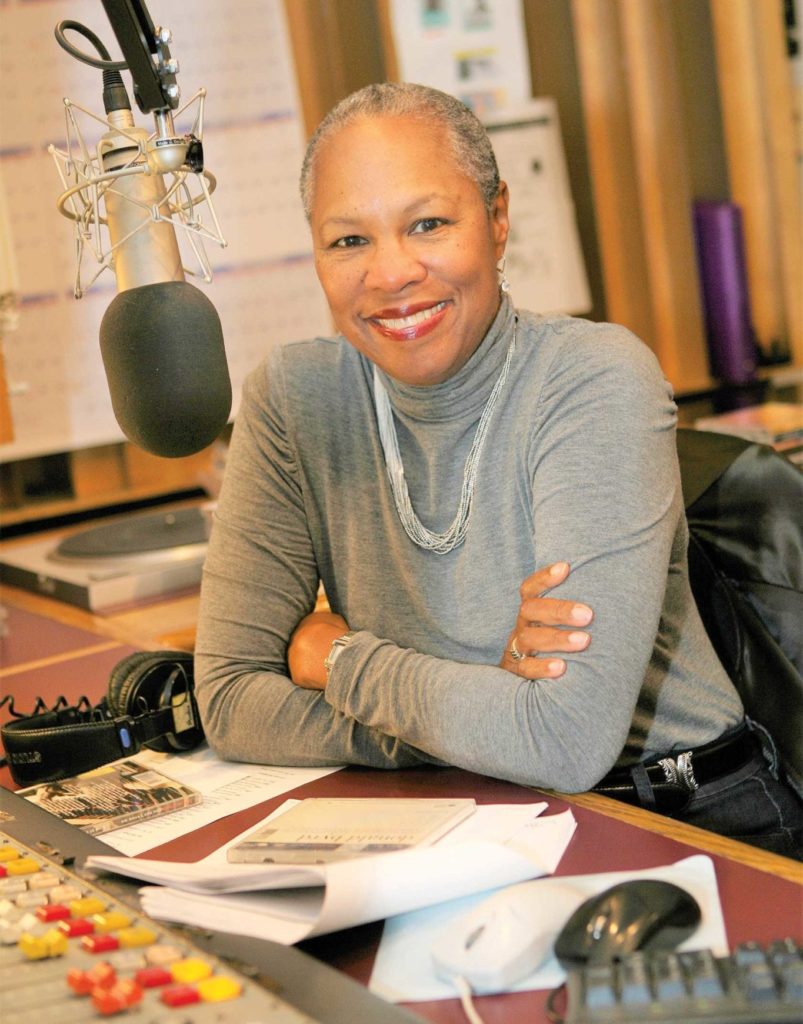
Rhonda Hamilton has a voice made for jazz radio: Smooth and mellow, with phrasing that has cadences like musical notes. Hamilton got her start in Boston after graduating from Boston University’s College of Communication and then became the music director of WBUR. Nowadays, Hamilton is nationally famous for being a host on Real Jazz, which airs on Sirius radio; you can hear her Monday through Friday from 9 a.m. to 3 p.m. She’s also busy hosting on WBGO out of Newark, New Jersey, where she helped to establish the sound on that iconic station starting at its launch in 1979. You can hear her there on Sunday Spotlight from 2-4 p.m. The Banner caught up with Hamilton from her home in Los Angeles.
Banner: What do you think it will take for more jazz programming to be on local and national radio?
Rhonda Hamilton: It is frustrating. So little jazz is on TV, either. At celebrations, for example, jazz musicians are often not included. It was wonderful then to hear John Legend perform “Feeling Good” in a Nina Simone arrangement as part of the inauguration. But, in general, people in charge of making programming decisions are not clued in. They don’t let it happen — but I know that more people would love it. The pandemic has added so much stress, and that may be part of the reason why I think that we will hear and see more jazz: It’s music that invites you to feel something. Like Wayne Shorter’s “Speak No Evil,” an album I featured on Sunday Spotlight.
What lies ahead on “Sunday Spotlight,” the show you do on WBGO?
The idea is to showcase legendary jazz artists like Wayne Shorter. Great recordings by great musicians. March is Women’s History Month, so I’ll be doing some-thing on the great composer and arranger Mary Lou Williams; she mentored many great musicians, including Dizzy Gillespie and Miles Davis, and her home in Harlem was like a salon.
When and how did you discover that jazz was meaningful to you?
I grew up with the music in New York. My father was a jazz fan; he knew Mercer Ellington, Cab Calloway and other musicians. There was always music at home — it was playing all the time. And on the radio in the car. Jazz was always something I listened to. Then in high school, a friend of mine was studying the piano. I went to his house and he put on “Awakening,” a record by the pianist Ahmad Jamal. I just thought, ‘Wow! This is fantastic!’ That record got me into the music, so it wasn’t just my parents. Later on, in college, jazz was popular on college radio. The Black Student Union would bring some of these musicians to perform on campus. All my friends were into jazz or R&B — there wasn’t that separation of music.
Any advice for youth who seek futures in broadcasting and music — especially women?
I studied broadcasting and film at school and then got an internship at WBCN, which was a progressive rock station. That’s where I met Eric Jackson; later on, he started a jazz show on WGBH. Eric told me of an opportunity at WBUR. I learned as I was doing. So, if you have an opportunity to be an intern, grab it! Ask as many questions as you can. Add to your skill set. That may even involve taking a class in acting or public speaking. Be yourself.
What challenges did you face along the way as a woman in jazz?
At the beginning, the challenge was to be taken seriously. I learned to stick up for myself; I learned that in the early stages of my career.
Any mentors?
Dr. Billy Taylor. He was the main person, in terms of jazz. Through his association with NPR, he got me to co-host their annual New Year’s Eve broadcast, “Toast of the Nation — Coast to Coast.” He promoted the music through various media, his radio show and as a CBS correspondent, for example. Dr. Taylor later became the artistic director of the Kennedy Center.
What emerging talents nowadays ought people keep an ear out for?
These are four of the artists who have already exhibited great talent and I think will continue to be important contributors to the music in the future: Alto saxophonist Lakecia Benjamin, trumpeter Giveton Gelin, drummer Allison Miller and harpist Brandee Younger.
For people unfamiliar with jazz as a force of social activism, can you say a few words that might illuminate the connection?
Jazz artists have always reflected what’s going on in society. The legacy of this music is of people expressing themselves. Individuality is encouraged as part of the music while at the same time, when you’re in a jazz band you have to listen to everyone in it or it doesn’t work. You have to be united and then be able to express yourself in solo improvisation. It’s the connection between jazz and democracy.






